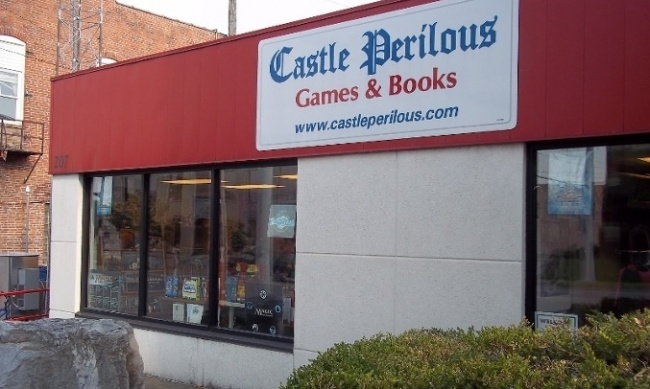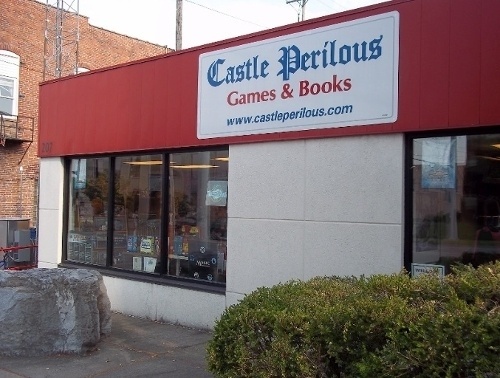Rolling for Initiative is a weekly column by Scott Thorne, PhD, owner of Castle Perilous Games & Books in Carbondale, Illinois and instructor in marketing at Southeast Missouri State University. This week, Scott Thorne talks about five reasons why customers should be buying from brick and mortar stores.
That is a question brick and mortar stores have to face every year and none more so than during the holidays. Granted, the overwhelming number of purchases are still made in brick and mortar stores (roughly 90% of retail sales are still made in brick and mortar stores, though this number is projected to decrease to 86% by 2021). Given that many customers are motivated by price and stuff really is generally cheaper online and, unfortunately, most of our customers are not altruistic enough to willingly spend more at their Friendly Local Game Store just to keep us in business, we need to give them reasons to spend money at the brick and mortar store, rather than online. So here are five good reasons to shop locally:
1. Immediacy. When the customer buys a product at a brick and mortar store, they get to use it immediately. With the exception of digital media and PDFs, everything else purchased online takes time to reach them, anywhere from a day to a month or better. I was just checking out a Kickstarter produced by a local publisher and backers will not receive the game until next March. Even modeling miniatures with a 3D printer takes several hours to complete.
2. Finding New Stuff. Despite the vast number of products available for sale online, in general customers don’t find new product online. They are three times more likely to find a new product that delights them in a physical store than in an online one (and don’t worry a lot about showrooming. According to Harris, 70% of customers webroom while only 45% of them showroom).
3. Reinvestment. More of their money stays in the local community when a customer shops at a local store. If a customer spends $100 at a local store, 68% stays in the local community while if they shop at a chain store, only 45% stays in the community to generate jobs and, of course, if they buy online, none stays in the local community. In addition, there is a multiplier effect when that money is spent in the community, meaning that money circulates to other business such as office supply stores, janitorial services etc. In a smaller community like here in Carbondale or London, Kentucky, the multiplier effect is only around 1 or 2 times before the money leaves the community but in a more metropolitan area such as Seattle, St. Louis or Chicago, you are looking at a multiplier of 7 to 10 times. And, of course, the sales taxes go back into such things as sidewalks, police, fire safety, sewers, etc.
4. Stronger Communities. Research shows that the more local businesses a community has, residents have stronger civic ties and are more likely to participate in civic affairs. Economic concentration among businesses leads to a monolithic local power structure and civic apathy. A larger number of locally owned businesses is positively correlated with participation in local elections and civic activism, helping to counter the decline in civic engagement in the US over the past several decades.
5. More Jobs. Local businesses create more jobs for local people. Maybe it indicates inefficiency, but local retailers create twice as many jobs as Amazon does for the same amount of revenue. Spending money at the FLGS helps maintain jobs, both there and in the large community.
You and I and every other game (and comic) shop owner know this. The trick is getting the word out to the general population. The healthier local businesses are, the healthier the communities their customers live in are.
The opinions expressed in this column are solely those of the writer, and do not necessarily reflect the views of the editorial staff of ICv2.com.

Column by Scott Thorne
Posted by Scott Thorne on November 5, 2018 @ 1:54 am CT
MORE GAMES
In 'Dracula vs. Hitler'; New RPG Just Unveiled by Devir Games
August 1, 2025
Devir Games unveiled Dracula vs. Hitler , a new RPG, that will be heading to BackerKit.
For 'Cosmere RPG'
August 1, 2025
Brotherwise Games previewed their Stormlight Premium Miniatures Collection, for Cosmere RPG.
MORE COLUMNS
Column by Scott Thorne
July 28, 2025
This week, columnist Scott Thorne comments on the Edge of Eternities prerelease and on Magic: The Gathering news from the Hasbro earnings report.
Column by Rob Salkowitz
July 21, 2025
Columnist Rob Salkowitz lays out the Comic-Con panels of interest to industry professionals, current and aspiring creatives, educators, librarians and retailers.








